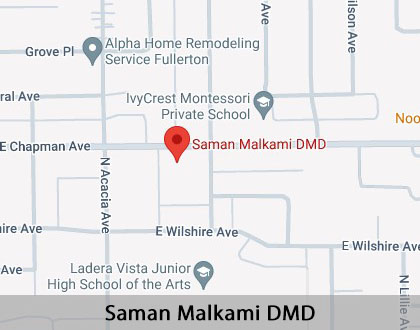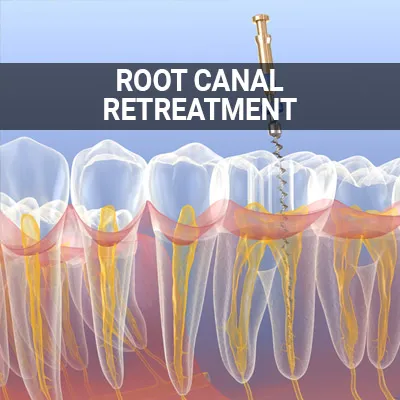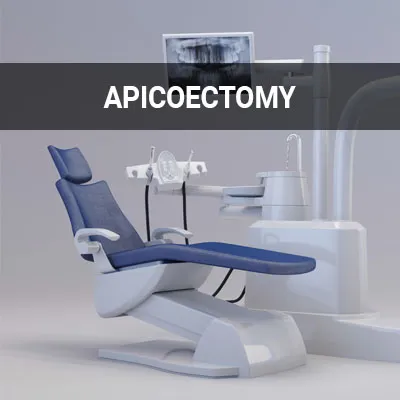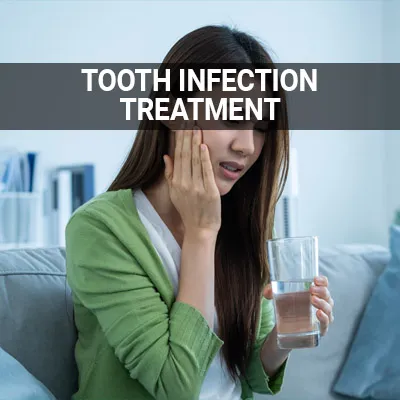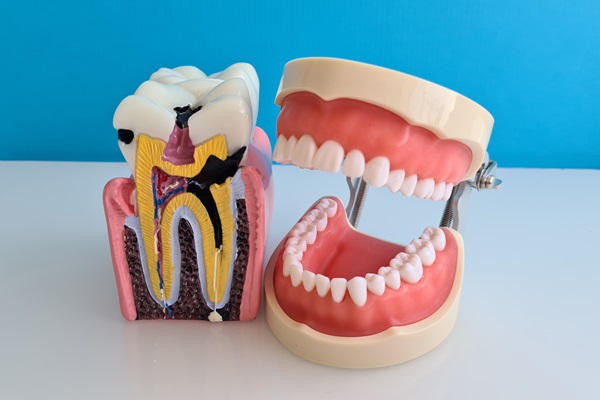Endodontic Treatment Aftercare Fullerton, CA
Endodontic aftercare is a critical consideration as a patient typically needs a second procedure to receive a permanent crown — thus protecting the treated tooth and restoring function. Endodontic therapy treats the soft tissues inside the tooth, or "dental pulp," and includes root canal treatments. In the meantime, the patient needs to be extra careful not to pull out the temporary crown and avoid foods that cause irritation or pain.
If you are undergoing an endodontic treatment, let Saman Malkami DMD in Fullerton help you understand what to expect. Our team offers a variety of endodontic treatments, including aftercare tips, so call us at (714) 459-8002 to learn more.
During Endodontic Therapy
A root canal treatment involves opening the top of the tooth, removing the dental pulp and the tissue surrounding the root. Next, we will need to clean and shape the canal before filling and sealing the tooth. A temporary crown may be necessary. However, endodontists do not treat the exterior of the tooth. To make sure the root canal is protected, a visit to your dentist is in order.
The dentist will place a crown (or other restoration) on the treated tooth, protecting it from exposure and restoring its function. In the meantime, the patient can take critical steps to help guard the unrestored tooth against potential fracture or infection.
“A root canal treatment involves opening the top of the tooth and removing the dental pulp and the tissue surrounding the root.”
Endodontic Recovery
It is normal to experience slight discomfort following an endodontic treatment. Any pain or pressure should resolve in a few days. The endodontist may recommend rinsing the mouth with lukewarm salt water or over-the-counter pain medications for quick relief.
During recovery, patients should stick to soft foods and continue brushing their teeth (twice daily) and flossing (once daily). However, be sure to use an extra light touch around sensitive areas to avoid pulling out the temporary crown.
“It is normal to experience slight discomfort following an endodontic treatment. Any pain or pressure should resolve in a few days.”
What Not to Do
Until the patient receives the permanent crown, the tooth will remain sensitive to extreme temperatures, and biting down may cause pain. First, refrain from eating anything until the anesthetic has worn off so as not to bite down too hard accidentally. Second, avoid sticky and hard foods that could pull out a temporary crown, as well as overly hot or cold foods and liquids that can cause irritation or pain. What not to eat:
- Hard foods (hard candies, peanut brittle, ice cubes)
- Overly hot or cold foods and drinks
- Sticky foods (chewy candies, taffy, gum)
“…avoid sticky and hard foods that could pull out a temporary crown, as well as overly hot or cold foods and liquids.”
Check out what others are saying about our dental services on Yelp: Endodontic Treatment Aftercare in Fullerton, CA
Advice on Food
Planning for endodontic aftercare should include stocking the kitchen with soft foods. The best things to eat after a root canal treatment or endodontic procedure require little chewing.
What to eat:
- Applesauce
- Cooked vegetables
- Fish
- Hummus or soft cheese spreads
- Lukewarm soup
- Mashed potatoes
- Meatloaf or shredded meat
- Pasta, quinoa, couscous, or other soft grains
- Ripe, canned, or cooked fruit
- Saltines, matzah or soft breads
- Scrambled eggs
- Smoothies
- Yogurt
“Planning for endodontic aftercare should include stocking the kitchen with soft foods.”
Questions Answered on This Page
Q. What happens in a root canal treatment?
Q. What can I expect following a root canal?
Q. What should I not do after a root canal?
Q. What can I eat after a root canal?
Q. What is the advantage of preserving natural teeth?
People Also Ask
Q. What can cause a tooth infection? What are the symptoms of a tooth infection?
Q. Why would a person need an apicoectomy?
Q. What circumstances require a root canal retreatment?
Q. What are the different parts of the tooth?
Preserving Natural Teeth
Endodontic treatment aims to save natural teeth, allow patients to eat the foods they love and maintain their genuine smiles. Endodontic therapy is clinically preferential over tooth extractions, which are more painful and require numerous follow-up procedures for fitting implants, bridges, or dentures. That translates to higher costs and treatment times.
While good oral hygiene is the best approach to preserving natural enamel and keeping dental pulp healthy, a root canal topped with a crown looks and functions like a natural tooth. Because the pulp gets replaced with nonviable material, a newly treated tooth will need a little extra attention. However, with proper care, a root canal can last a lifetime.
“A root canal topped with a crown looks and functions like a natural tooth.”
Frequently Asked Questions
Q. How long does it take to recover from a root canal?
A. Recovery times can vary by case. It is important to remember that following proper aftercare advice is important for a successful and speedy recovery. The majority of patients recover from their root canal in a few days.
Q. What are some possible complications that could arise during recovery?
A. Complications are rare, but they do happen. Contact our office immediately if pain increases or you have any of the symptoms you had before the procedure, notice signs of infection. Our team is equipped to handle any possible side effects and help you keep your mouth healthy post-treatment.
Q. Will a root canal ever have to be redone?
A. The majority of root canals last a lifetime. However, there is a remote possibility that a root canal may have to be redone. Patients can reduce that chance of needing retreatment by following a strict oral hygiene routine and properly caring for the root canal-treated tooth.
Q. Will my insurance cover endodontic treatment?
A. Most dental plans do cover endodontic treatment. The amount of coverage depends on your plan and the amount of treatment you need. We advise patients to check with their dental insurance provider about the specifics of their plan.
Q. Can an endodontist put on the temporary crown?
A. The endodontist usually performs the root canal and the filling. Typically, the patient goes to a dentist for the permanent crown. The endodontist may place a temporary crown over the treated tooth to protect it until the permanent crown is ready.
Start Feeling Better – Visit Us Today
By visiting us as soon as possible, our team can help get you the professional treatment you need. Instead of waiting around and allowing the symptoms to get worse, we can provide you with treatment options.
Definitions
Learn More About Endodontic Treatment Aftercare
Endodontic therapy requires two or more procedures: for example, a root canal followed by crown placement. Endodontic aftercare is especially crucial to help protect your unrestored tooth between procedures. Avoid hard or chewy foods, as well as overly hot or cold items. Rinse your mouth with lukewarm salt water to keep it clear of infection and to provide quick relief. Finally, practice good oral hygiene to help preserve your natural teeth and maintain your root canal for a lifetime.
If you are in search of endodontic treatment in Fullerton, let Saman Malkami DMD help. Call us at 714-459-8002 to learn more about our services and policies.
Helpful Related Links
- American Association of Endodontists. Post Treatment Care. 2024
- Cleveland Clinic. Restorative Dentistry. 2024
- GoodRx. Tooth Infection: Symptoms, Causes, Treatment and More. 2024
- Healthline. When and What to Eat After a Root Canal. 2024
- Mayo Clinic. Mayo Clinic. 2024
- National Library of Medicine. Dental follow-up and maintenance index. 2024
- News Medical. Root Canal Treatment Procedure. 2024
- WebMD. What to Know About a Temporary Dental Crown. 2024
About our business, license, and website security
- We accept the following payment methods: American Express, Cash, Check, Discover, MasterCard, and Visa
- We serve patients from the following counties: Orange County
- We serve patients from the following cities: Fullerton, Placentia, Anaheim, Anaheim Hills, Yorba Linda, Buena Park, Brea, Orange, Irvine, Tustin, Newport Beach, West Minister, Garden Grove, Whittier, Fountain Valley, and Long Beach
- CA (License #51168). View License Information and Specifics
- National Provider Identifier Database (1205909132). View NPI Registry Information
- Healthgrades. View Background Information and Reviews
- Norton Safe Web. View Details
- Trend Micro Site Safety Center. View Details
Back to top of Endodontic Treatment Aftercare

